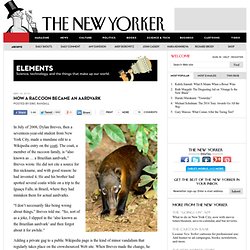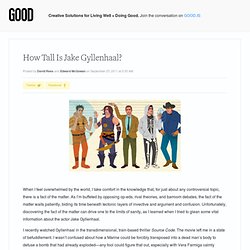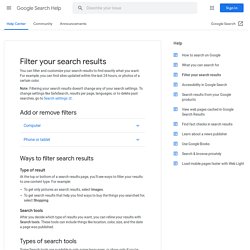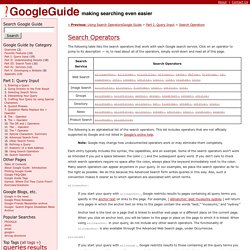

How a Raccoon Became an Aardvark. In July of 2008, Dylan Breves, then a seventeen-year-old student from New York City, made a mundane edit to a Wikipedia entry on the coati.

The coati, a member of the raccoon family, is “also known as … a Brazilian aardvark,” Breves wrote. He did not cite a source for this nickname, and with good reason: he had invented it. He and his brother had spotted several coatis while on a trip to the Iguaçu Falls, in Brazil, where they had mistaken them for actual aardvarks.
“I don’t necessarily like being wrong about things,” Breves told me. “So, sort of as a joke, I slipped in the ‘also known as the Brazilian aardvark’ and then forgot about it for awhile.” Adding a private gag to a public Wikipedia page is the kind of minor vandalism that regularly takes place on the crowdsourced Web site. Over time, though, something strange happened: the nickname caught on. Jimmy Wales’s battle for his birthday and the mischievous edits of Stephen Colbert are amusing, but probably harmless. How Tall Is Jake Gyllenhaal? When I feel overwhelmed by the world, I take comfort in the knowledge that, for just about any controversial topic, there is a fact of the matter.

As I’m buffeted by opposing op-eds, rival theories, and barroom debates, the fact of the matter waits patiently, biding its time beneath tectonic layers of invective and argument and confusion. Unfortunately, discovering the fact of the matter can drive one to the limits of sanity, as I learned when I tried to glean some vital information about the actor Jake Gyllenhaal. I recently watched Gyllenhaal in the transdimensional, train-based thriller Source Code. The movie left me in a state of befuddlement. I wasn’t confused about how a Marine could be forcibly transposed into a dead man’s body to defuse a bomb that had already exploded—any fool could figure that out, especially with Vera Farmiga calmly explaining it 100 times.
I’m not the sort of person who thinks much about the height of celebrities. “Met Jake at the Weinstein Oscar Party. A Google a Day. History Is Written By The Tricksters. Hoax Sites. Search tools and filters - Search Help. Depending on the type of place you searched, you could see some of these filters: Your past visits: Narrow results to places you have or haven't visited.

Rating: Filter by the rating given by other people who use Google. Cuisine: See results based on the type of food served. Price: Filter by how much a restaurant or other place costs. Hours: Limit results based on when the place is open. Add or remove places you've visited To get better search results, you can tell Google whether you have or haven't been to a place. On your phone: Under "Overview," tap You visited here __ days/weeks/years ago. Note: To filter by places you've visited, turn on Location History on your Android device or iPhone or iPad, and turn on Web and App Activity. Google Guide Quick Reference: Google Advanced Operators (Cheat Sheet)
The following table lists the search operators that work with each Google search service.

Click on an operator to jump to its description — or, to read about all of the operators, simply scroll down and read all of this page. The following is an alphabetical list of the search operators. This list includes operators that are not officially supported by Google and not listed in Google’s online help. Each entry typically includes the syntax, the capabilities, and an example. Some of the search operators won’t work as intended if you put a space between the colon (:) and the subsequent query word. Allinanchor: If you start your query with allinanchor:, Google restricts results to pages containing all query terms you specify in the anchor text on links to the page.
Anchor text is the text on a page that is linked to another web page or a different place on the current page. Allintext: allintitle: allinurl: In URLs, words are often run together.